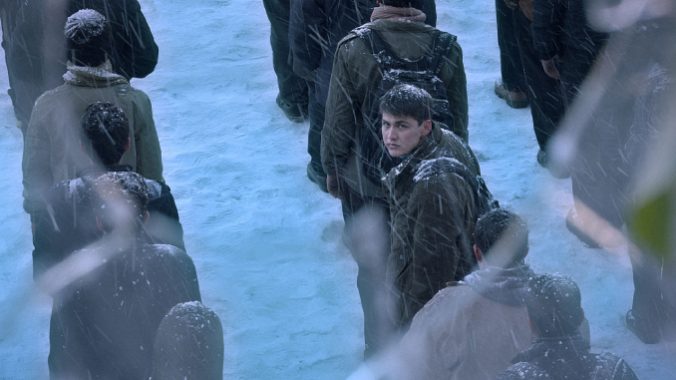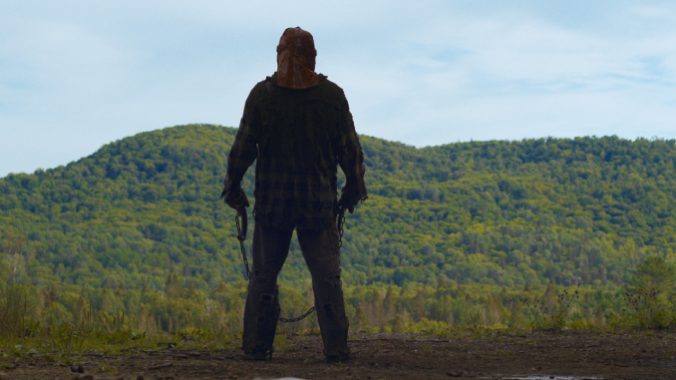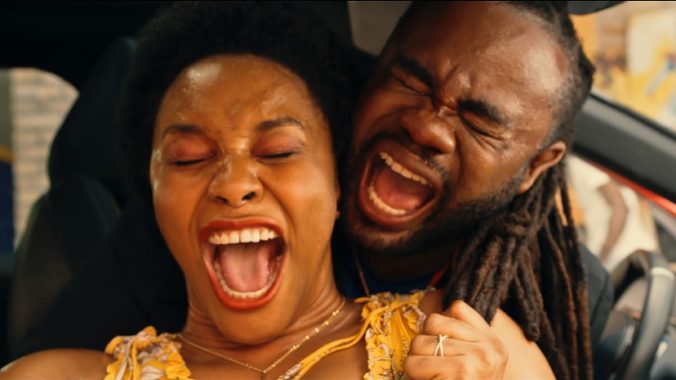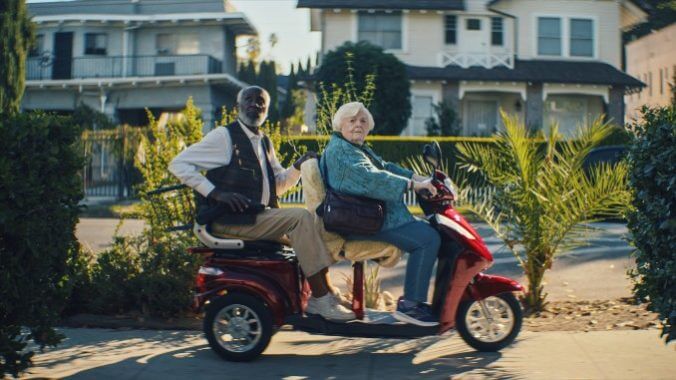Sundance 2024: Our 10 Most Anticipated Films

Our Sundance 2024 most anticipated films come from all over the world and represent the most exciting new talent (and intimate stories) hitting the warm theaters up in snowy Park City this year. Though the virtual infrastructure remains in place from its back-to-back online-only years, Sundance’s online access has changed as the festival continues to encourage in-person attendance: It’ll only offer online viewing of certain movies from January 25 – 28. But that doesn’t mean you won’t be getting the goods even if you’re watching from home. Though its expansive slate—Sundance ramped up from 2021 to 2023, moving from 72 feature films to over a hundred in 2023—has contracted a bit, with 82 feature films in the program this year, the festival has plenty to offer across its Premiere, Midnight, Next and Competition categories. We dipped a toe into all of them, watching a boom of speculative AI documentaries and exciting dramatic debuts from all over the world, to find you some of the most exciting movies you won’t want to miss—and which don’t have big-name movie stars backing them up.
As per usual, Paste will be covering the festival from afar, pumping out reviews throughout the fest’s run from January 18–28, but with the benefit of some sneak peeks, we’ve been able to narrow down a handful of movies that shouldn’t be skipped. If these pique your interest and you want to learn more, or if you just want to take in the flood of films that may soon be dominating Film Twitter conversations for the next year and change, you can find the full program here.
Here are Paste’s 10 most anticipated films at the 2024 Sundance Film Festival:
Agent of Happiness

Imagine if your government was, even superficially, concerned with your happiness. While so many countries use the boogeyman of The Economy to distract its people from the atrocities of the world (sometimes committed by those very countries), Bhutan, brilliantly, found a far buzzier acronym than Gross Domestic Product. It tracks Gross National Happiness. No more worrying about vague manipulable factors like inflation or the unemployment rate—just ask yourself, “Am I happy?” Ok, to be fair, Arun Bhattarai and Dorottya Zurbó’s documentary Agent of Happiness makes it clear that it’s a lot more complicated than that (and just as made up as stock prices). But even if the Bhutanese government doesn’t really care if its people are happy, posing this question to its populace is at least a diversion that encourages introspection. Those on the front lines, collecting this data for the government, are professionally confronted by life’s biggest question, interpreted by people from all walks of life. The quiet, intimate charms of Agent of Happiness pulse from this poignant collective consideration, filtered through the personal experience of a professional happiness inspector. Amber and his coworker drive around the mountainous countryside, looking for folks whose lives they can translate into numbers, recorded on forms and diluted down to a single digit through their job’s complex happiness formula. These census-takers strike a memorable image, in their plaid knee-length gho, white tego underneath with sleeves rolled back, black baseball caps and tall socks. Door-to-door style-wise, Mormons have nothing on Bhutanese government officials. As Amber plays air guitar in the passenger seat and chats about his lacking love life, Agent of Happiness immerses us in a doc that’s partially invested in the day-to-day of a unique profession, partially enraptured by the beauty of Bhutan’s bright colors and vast vistas, and partially surprised to have found itself on a buddy-comedy road trip. As we watch everyday people think deeply about this high-stakes satisfaction survey, the act of asking our friends and neighbors how they’re doing—how they’re really doing—develops an alluring grassroots appeal beyond the bragging rights of institutions. Agent of Happiness, with its personal point-of-view and delightfully candid discussions, motivates us to use our compassion for individuals to see past this façade.
Black Box Diaries

All stories documenting the personal anecdotes making up the #MeToo movement are courageous. Speaking up about a painful truth, knowing that if society at large was going to listen with generosity or empathy, well, it wouldn’t need a movement to get these tales told. They are brave alliances between survivors and journalists, battling entrenched sexism with unrelenting professionalism and mutual trust. Black Box Diaries tracks a moving #MeToo story that brought the movement to Japan, from the crime itself, through the journey of going public and to the uneasy closure of its long war of attrition. Its devastation is familiar. But because filmmaker Shiori Itō is both survivor and journalist, and recorded her own investigation into her assault in real time, the documentary becomes a thrilling testament to her exceptional, tenacious agency in the face of a hostile world. A bit like how Navalny saw Russian opposition leader Alexei Navalny pursue the men Vladimir Putin sent to assassinate him, there’s a macabre adrenaline running through the first-person perspective of Black Box Diaries. Nobody has the same incentive to bring about justice than the survivors themselves. There’s also the same interconnectedness of sinister power on the other side: Itō’s attacker is Noriyuki Yamaguchi, biographer of then-Prime Minister Shinzo Abe, whose government maintained the same sexual assault laws for over a century. Yamaguchi’s political and police connections protect him from arrest at least once, and gets a helpful detective removed from Itō’s case. If all sexual assault cases are uphill battles, Itō’s is a Sisyphean conspiracy. And we get a front-row seat to the endless struggle. Not shying down from the crushing interconnectedness of powerful forces set against her, Itō’s journalistic rigor and personal vulnerability prevents a landmark moment in a movement from becoming a simple summary in a history book.
Eternal You

It stands to reason that if there’s money to be made in biotech, there’s an equal amount to be made in necrotech. Eternal You explores the sectors of the artificial intelligence business that’s wasted no time adopting the psychological tricks of the spiritual trade and applying them to chatbots and CG models. Hans Block and Moritz Riesewieck’s Eternal You observes the burgeoning industry around techno-spiritualism with wry skepticism. While AI in general is currently being sold as a miracle do-it-all to the most credulous among us, this specific use of AI is targeted towards an even more vulnerable demographic: The credulous and grieving. And those working behind the scenes are used to grifting. As Eternal You listens to those in charge of these startups, like Project December founder Jason Rohrer, we hear self-assured PR exaggerations. It’s showmanship. It’s the crystal ball, the velvet curtains, the copious candles. It’s the stuff that gets you funded by the rich and attracts comfort-seekers to your website. The filmmakers then immediately rebut with people like Carl Öhman, who are willing to cut through the bullshit about this segment of the AI gold rush pursued by “the most skillful in turning the dead into a business.” Their straight talk is an oasis, especially when the topic involves one people are inclined to be too hurt to be anything but trusting around: Death. It’s all existentially depressing, housed in a bleak aesthetic. A glitchy score from Gregor Keienburg and Raffael Seyfried harmonizes reversed and edited vocalizations in an aural replica of Eternal You’s central concept, its soothing inhumanity haunting cold drone shots. Block and Riesewieck aren’t afraid to show off a little style, which goes a long way when covering subject matter that inherently entails a lot of sitting at the keyboard, staring at a screen. Wide shots, giving a broader montaged context to human experience, go a long way to underscore the impossible concept of replicating consciousness. Balancing this is an icy off-handedness. Even cathartic, emotional moments are filtered through imperfect technological lenses: Reality TV, computer monitors, iPhone speakers, text on a screen. Eternal You is a necessary warning klaxon for our culture’s increasing inability to accept death, just as it finds a techno-economic structure happy to oblige it.
Girls State
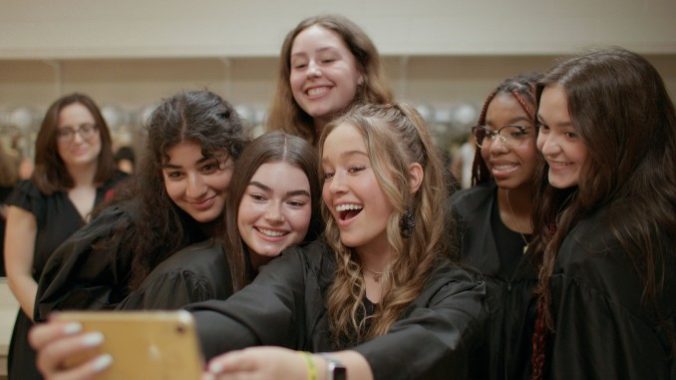
A follow-up to their 2020 documentary Boys State, Amanda McBaine and Jesse Moss’ Girls State returns to the American Legion’s week-long government workshop, this time observing the girls’ side of things as, for the first time, the Boys and Girls State programs will be on the same campus in Missouri. While their first movie—as our Dom Sinacola put it, “a dramatic account of modern American masculinity in the making, blisteringly hormonal and desperate to be taken seriously”—was interested both in this microcosm of politics and the kind of concentrated Lord of the Flies testosterone that comes up with the “screaming masses of peachfuzz and popularity contests,” Girls State finds more compelling ground as its politically active Gen Zers not only question U.S. politics, but the very event that they’re attending. It does a heart good to see a bunch of teens across the political spectrum (mostly progressive, all feminist) use their informed, confident stances to confront power…especially when that power lies with, say, the counselors and organizers of Girls State. Though shot conventionally and with a sometimes-overbearing patriotic score, Girls State offers insight into up-and-coming political actors and a few thrilling juxtapositions. What better climate is there to talk to a bunch of civic-minded young women than one in which Roe v. Wade is actively being overturned?
-

-

-

-

-

-

-

-

-

-

-

-

-

-

-

-

-

-

-

-

-

-

-

-

-

-

-

-

-

-

-

-

-

-

-

-

-

-

-

-


